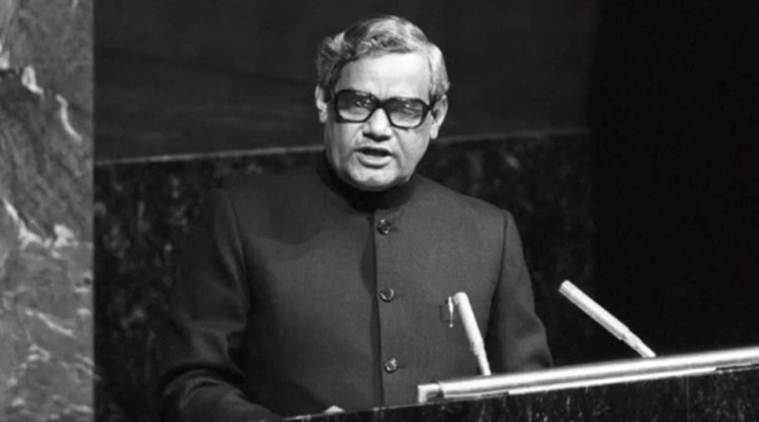 Former Prime Minister Atal Bihari Vajpayee. (File Photo)
Former Prime Minister Atal Bihari Vajpayee. (File Photo)
The death of former Prime Minister Atal Bihari Vajpayee has spawned tributes and analyses in the Subcontinent, beyond India as well. Dawn, in its editorial on August 18, looks at India’s first non-Congress prime minister to have completed a full term from a Pakistani perspective.
First, the editorial states that “where the political right in India is struggling to produce a true statesman and national leader today, Atal Bihari Vajpayee once combined a formidable intellect with political skill and organisation to widen the political mainstream in that country.”
Second, Dawn looks unfavourably on the Pokhran-II nuclear tests because they ushered in an era of “overt nuclearisation in South Asia” and “arguably forever changed the security equation in the region”.
But, in sum, the newspaper is also glowing in its assessment of Vajpayee’s attempts at brokering peace between India and Pakistan: “Vajpayee undeniably showed great courage and vision in travelling to Pakistan by bus at the invitation of then-Pakistani prime minister Nawaz Sharif. The Lahore declaration that was signed by the two prime ministers in February 1999 is a high point in the last two decades in the quest for the normalisation of relations between the nuclear-armed rivals.” The editorial ends with the hope that the “Vajpayee path with Pakistan can be returned to by the BJP and by India”.
An epoch ends
Rajan Philips, in an article on August 18 in Sri Lankan newspaper The Island, writes on the passing of three of “India’s epochal leaders” — Atal Bihari Vajpayee, Somnath Chatterjee and M Karunanidhi. At the time of Independence, organisations all three were part of were overshadowed by the “banyan tree that was the Indian National Congress” but gradually “integrated into the politics of Indian federalism and played crucially different roles in the consolidation and furtherance of the federalist promise that was India in 1947”.
After summarising Vajpayee’s career, the article compares his statesmanship somewhat unfavourably with Prime Minister Narendra Modi: “The current BJP Prime Minister Narendra Modi is poised to break that [Vajpayee’s] record by serving out his first full term and going on to win a second term in the general election next year. Unlike Modi, Vajpayee was a man of compromise and consensus builder. He was a voice of moderation within the cacophony of Hinduthva (sic) nationalism. And he put himself at the service of his party, unlike Modi who calls all the shots both in the party and in the government.”
Somnath Chatterjee, states Philips, was a constitutionalist, respected parliamentarian and Speaker of the Lok Sabha. His treatment by the CPM, however, has come to define the weaknesses of the party’s organisational, ideological and bureaucratic structure. Chatterjee was expelled for not resigning as Speaker and voting with the BJP against a Congress-led government over the Indo-US nuclear deal. Then “the Politburo expelled him from the Party…The Congress/UPA won again in the 2009 election, while the CPM fared rather badly. Subordinating elected Party MPs to its diktats has been typical of the CPM bureaucracy.”
Philips then writes of Karunanidhi, who “for 50 years was the central figure in the ebb and flow of Tamilian nationalism and a key regional leader in the transformation of Indian federalism”. He stood against caste, religion, Hindi nationalism and feudalism, and as chief minister, “ it will not be an exaggeration to say that Karunanidhi presided over the development and diversification of the state’s industrial base. He was respected even among his critics as a swift decision maker and a consummate deal maker. He was known for keeping files ‘moving’ in government, unlike his rival MGR who was known for ‘piling’ them.” But the article is also critical of the giant of Tamil politics: “Just as his life story is a history of Tamil Nadu politics, his legacy mirrors the conflicts and contradictions of the society in Tamil Nadu. The main source of his blemished legacy is the family and corruption involving family members. No single family in Tamil Nadu has become so politically aggrandised as the Karunanidhi family. Karunanidhi and his family members have been the subjects of a number corruption inquiries.”